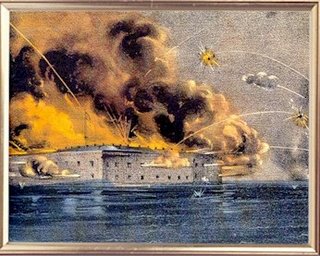rindle - noun - a small water course or gutter
Today, I start a series of words from Charles MacKay's Lost Beauties of the English Language which I find fascinating. MacKay generated his own short list of words in a rudimentary dictionary which was sold in the 1870's. He had a rather pedantic view that a nation's barbarous language was an indication of the barbarousness of the nation as a whole, and he set about to change that. His dictionary was, perhaps in his view, a call to return to some of the less used, but beautiful words of the English language.
Friday, February 09, 2007
ante-bellum

ante-bellum - adj - Latin, lit. "before-the-war," in U.S., usually in ref. to American Civil War (1861-65).
Even my feeble Latin can handle this one: Ante = before, bellum = war. One thing I have retained from my high school Latin is an appreciation for Latin (and Greek) as an English vocabulary builder. Take 'bellum' as an example; what do you think the English word 'bellicose' might mean? Or to give just one more example out of thousands I could produce, how about 'culina' (kitchen)? Does culinary ring any bells? I realize I'm preaching to the choir here, and nothing I've written will be new to you, but it's a good thing to keep in mind when you're teaching your children.
As for the ante-bellum period in our misnamed Civil War, which I say runs from 1846-1861, the book to read is David Potter's The Impending Crisis. (1846 is the year the Mexican War began. What makes it the starting point for the events leading up to the central event in our history was tobacco-chomping, whiskey-guzzling, Pennsylvania congressman David Wilmot's proviso to a bill to provide funding for purchase of land acquired from Mexico; it stated that slavery was to be forbidden in all such purchased lands. The proviso was defeated, but it was the first in a sad chain of events that include the Compromise of 1850, the Fugitive Slave Act of 1852, the Kansas-Nebraska bill, the founding of the Republican Party in 1856, Dredd Scott vs. Sanford, the border war between Kansas and Missouri, the Lincoln-Douglas debates, John Brown's raid on Harper's Ferry, the splitting of the Democratic Party in 1860, the election of Abraham Lincoln, and the secession of South Carolina in December, 1860, followed by secession of the six Gulf states.) (Yes, I know I indulged in some ad hominems above, but I'll stand by them.)
Subscribe to:
Comments (Atom)